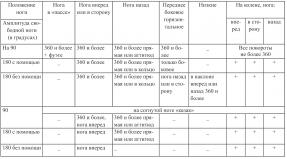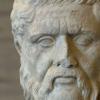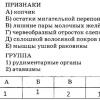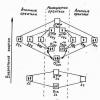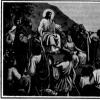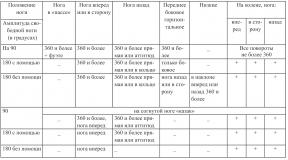The Beatitudes. Sermon on the Mount. Gospel beatitudes

The Beatitudes given to us by the Savior do not in the least violate the commandments of the law. On the contrary, these commandments are mutually complementary.
The Ten Commandments of the Law are limited to prohibiting doing what is sinful. The Beatitudes teach us how we can achieve Christian perfection or holiness.
The Ten Commandments were given in Old Testament times to keep wild and rude people from evil. The Beatitudes were given to Christians to show them what spiritual disposition they should have in order to draw closer and closer to God and gain holiness, and at the same time bliss, that is, the highest degree of happiness.
Holiness, born of closeness to God, is the highest bliss, the highest happiness that a person can desire.
The Old Testament law is the law of strict truth, and the New Testament law of Christ is the law of Divine love and grace, which alone gives people the strength to fully observe the law of God and approach perfection.
Jesus Christ, calling us to the eternal Kingdom of God, shows the way to it, through the fulfillment of His commandments, for the fulfillment of which He promises, as the King of heaven and earth, eternal bliss in the future eternal life.
Jesus Christ says:
2. Blessed are those who cry, for they will be comforted.
5. Blessed be the mercy that there will be mercy.
6. Blessed are those who are pure in heart, for they will see God.
7. Blessed are the peacemakers, for these shall be called sons of God.
8. Blessed is the expulsion of truth for the sake of them, for the kingdom of heaven is theirs.
9. Blessed are you when they revile you, and despise you, and say all sorts of evil things about you lying, for my sake. Rejoice and be glad, for your reward is many in heaven.
In each of these sayings or instructions of the Lord one should distinguish, on the one hand, a teaching or commandment, and on the other, an indulgence or a promise of reward.
To fulfill the Beatitudes it is necessary: communication with God - prayer, internal and external; fight against sinful tendencies - fasting, abstinence and so on.
About the first beatitude
1. Blessed are the poor in spirit, for to them is the kingdom of heaven.
Blessed are the poor in spirit, that is, the humble; because theirs is (that is, the Kingdom of Heaven will be given to them).
Blessed, that is, extremely happy and pleasing to God; poor in spirit- humble, who are aware of their imperfection and unworthiness before God and never think that they are better or holier than others; like- for, because; those- their.
Spiritual poverty
there is a spiritual conviction that our life and all our spiritual and physical blessings (such as life, health, strength, mental abilities, knowledge, wealth and all sorts of worldly blessings), all this is a gift from the Creator God: without heavenly help it is impossible to acquire , neither material well-being, nor spiritual wealth - all this is God's gift.
Spiritual poverty is called humility, and her virtue is humility.
Humility or humility is the main Christian virtue, because it is the opposite of pride, and all the evil in the world came from pride. The first of the angels became the devil, the first people sinned, and their descendants quarrel and are at enmity with each other because of pride. " The beginning of sin is pride"(Sir. 10, 15).
Without humility, turning to God is impossible, no Christian virtue is possible.
Humility gives us the opportunity to know ourselves, to correctly evaluate our strengths and weaknesses; it has a beneficial effect on the fulfillment of our duties towards our neighbors, arouses and strengthens in us faith in God, hope and love for Him, attracts God’s mercy to us, and also makes people inclined towards us.
The Word of God says: " The sacrifice to God is a broken spirit, a contrite and humble heart, God will not despise"(Ps. 50 , 19); "God resists the proud, but gives grace to the humble"(Prov. 3 , 34). “Learn from Me,” the Savior instructs, “for I am gentle and lowly in heart, and you will find rest for your souls.”(Matt. 16 , 29).
Physical poverty, or poverty, can greatly contribute to the acquisition of spiritual poverty, if this poverty, or poverty, is accepted willingly and without complaint. But the “physically poor” cannot always be “spiritually poor.”
And the rich can be “poor in spirit” if they understand that visible, material wealth is perishable and fleeting, and that it cannot replace spiritual wealth; if they remember the words of the Lord: “What does it profit a man if he gains the whole world and loses his own soul? or what ransom does a man give for his soul?” (Matt. 16 , 26).
But Christian humility must be strictly distinguished from selfish self-abasement that undermines human dignity, such as sycophancy, ingratiation, etc.
We must, at the same time, strictly turn away from the so-called “noble pride” or “defense of insulted honor,” reflecting prejudices and harmful superstitions remaining among European peoples as a legacy of Roman paganism hostile to Christianity. A true Christian must resolutely renounce these prejudices, which have created the anti-Christian and shameful custom of duels.
As a reward for the poor in spirit, that is, the humble, the Lord Jesus Christ promises the Kingdom of Heaven, that is, an eternally blissful life. The poor in spirit begin to feel this participation in the Kingdom of God even here, through faith and hope in God, and finally and in all its fullness they receive it in the future life.
About the Second Beatitude
2. Blessed are those who cry, for they will be comforted.
Blessed are those who mourn (for their sins); because they will be comforted.
Crying
Those who cry and grieve for their sins; tii- They.
The crying spoken of in the second beatitude is, first of all, true sorrow of the heart, and tears of repentance for the sins we have committed, for our guilt before a merciful God (for example, the crying of the Apostle Peter after his denial).
“For Godly sorrow produces repentance that results in salvation; but worldly sorrow produces death,” says the Apostle Paul (2 Cor. 7 , 10).
Sorrow and tears caused by misfortunes that befall us, for example, the death of people dear to us (Christ Himself shed tears at the death of Lazarus), can be spiritually beneficial, if only these sorrows and tears are imbued with faith and hope, patience and devotion to the will of God.
Moreover, sorrow and tears caused by compassion for the misfortune of one’s neighbor can lead to bliss, if these tears are sincere and accompanied by deeds of Christian charity towards love.
The sadness of this world is sadness without hope in God, which comes not from the consciousness of one’s sinfulness before God, but from the dissatisfaction of ambitious, power-hungry and selfish aspirations. Such sadness, through despondency and despair, leads to spiritual death, sometimes accompanied by physical death (suicide). An example of such sadness is Judas Iscariot, who betrayed Christ the Savior.
As a reward for those who cry, the Lord promises that they will be comforted - they will receive forgiveness of sins, and through this inner peace, they will receive eternal joy, that is, eternal bliss.
About the third beatitude
3.Blessed are the meek, for they will inherit the earth.
Blessed are the meek, for they will inherit (take possession of) the earth.
Meek, gentle; like- because, because.
Meekness is a calmer, full of Christian love, state of the human spirit, in which a person never gets irritated and never allows himself to grumble, not only towards God, but also towards people.
Meek people do not get irritated themselves and do not irritate other people.
Christian meekness is expressed mainly in patiently enduring insults caused by others, and is the opposite of anger, malice, self-exaltation and vindictiveness.
A meek person always regrets the hardness of the heart of the person who has offended him; wishes him correction; prays for him and submits his actions to the judgment of God, heeding the instructions of the Apostle; "If it is possible for you, be at peace with all people. Do not avenge yourselves, beloved; vengeance is Mine, I will repay, says the Lord" (Rom. 12 , 18-19).
The highest example of meekness for us is our Lord Himself, Jesus Christ, who prayed on the cross for His enemies. He taught us not to take revenge on our enemies, but to do good to them. “Learn from Me, for I am gentle and lowly in heart, and you will find rest for your souls” (Matt. 11 , 29).
Meekness conquers the most cruel hearts of people, as observation of human life convinces us of this, and the entire history of the persecution of Christians confirms this.
A Christian can only be angry at himself, at his own sins and at the tempter - the devil.
The Lord promises the meek that they will inherit the earth. This promise means that meek people in this life, by the power of God, are preserved on earth, despite all the intrigues of man and the most severe persecution, and in the future life they will be heirs of the heavenly fatherland, new land(2 Pet. 3 , 13) with its eternal benefits.
About the Fourth Beatitude
4. Blessed are those who hunger and thirst for righteousness, for they will be satisfied.
Blessed are those who hunger and thirst for righteousness (desiring righteousness); because they will be satisfied.
There are those who really want to; thirsty- very thirsty; hungry and thirsty for truth- those who desire truth as much as a hungry person desires to eat and a thirsty person to drink.
Hungering and thirsting for truth, these are those people who, deeply aware of their sinfulness, that is, guilt before God, fervently desire the truth. They try to please God with their lives in truth, that is, according to Christ’s Gospel law, which requires from Christians the most holy justice in all their relations with their neighbors.
The expression “hungry and thirsty” shows that our desire for truth should be as strong as the desire of the hungry and thirsty to quench their hunger and thirst. King David expresses this desire beautifully: “As a deer thirsts for streams of water, so does my soul thirst for You, O God! My soul thirsts for the mighty, living God” (Psalm. 41 , 2-3).
The Lord promises those who hunger and thirst for righteousness that they will be satisfied. Here we mean spiritual saturation, consisting in inner, spiritual peace, peace of conscience, justification and pardon. This saturation in life here on earth only happens partially. But to those who hunger and thirst for righteousness most of all, the Lord reveals the secrets of His kingdom, and their hearts, even in this world, enjoy the knowledge of the truths revealed in the Gospel of God, that is, our Orthodox Christian teaching.
They will receive complete saturation, that is, complete satisfaction of the holy aspirations of the human spirit, (and hence the highest joy, bliss) in the future, eternal, blissful life with God; as the Psalmist says, King David: " I will be satisfied, never to appear in Your glory"(Ps. 16 , 15).
About the Fifth Beatitude
5. Blessed are the mercy, for there will be mercy.
Blessed are they who have mercy, for they will receive mercy.
For, because; tii- such people, they.
Merciful or merciful, these are those people who are compassionate towards others, with all their hearts they feel sorry for people who are in trouble or misfortune, and try to help them with good deeds.
Works of mercy are material (bodily) and spiritual.
Material works of mercy (bodily):
1. Feed the hungry.
2. Give drink to the thirsty.
3. To clothe the naked or lacking in clothing.
4. Visit someone in prison.
5. Visit the sick person and help him recover or Christianly prepare for death.
6. Take the wanderer into the house and give him rest.
7. Bury the dead of the poor.
Spiritual works of mercy:
1. By word and example “to turn the sinner from the wrong path” (Jas. 5 , 20).
2. Teach the non-leader (those who don’t know) truth and goodness.
3. Give good and timely advice to your neighbor in difficulty and danger.
4. Comfort the sad.
5. Do not repay evil for evil.
6. Forgive offenses with all your heart.
7. Pray to God for everyone.
The Lord promises the merciful as a reward that they themselves will pardoned; that is, at the future judgment of Christ, the special mercy of the righteous Judge will be shown to them: they will be delivered from eternal condemnation for their sins, just as they showed mercy to others on earth (see Gospel of Matt. 25 , 31-46).
About the Sixth Beatitude
6. Blessed be the pure in heart, for they will see God.
Blessed are the pure in heart, for they will see God.
Pure in heart are those people who not only do not openly sin, but also do not harbor vicious and unclean thoughts, desires and feelings in themselves, in their hearts. The heart of such people is free from attachments and addictions to corruptible earthly things, and in general free from sinful passions generated by selfishness, that is, pride and pride. People who are pure in heart always, unceasingly think about God.
In order to acquire purity of heart, one must maintain the fasts commanded by the Church, and in every possible way protect oneself from overeating, drunkenness, indecent shows and amusements, and from reading obscene, immodest books.
Purity of heart is much higher than simple sincerity. Purity of heart consists only in the sincerity and frankness of a person in relation to others, and purity of heart requires the complete suppression of vicious thoughts and desires and constant remembrance of God and His holy law.
The Lord promises people with a pure heart as a reward that they will see God. Here on earth they will see Him gracefully and mysteriously, with the spiritual eyes of the heart. They can see God in His appearances, images and likenesses. In the future eternal life they will see God “as He is” (1 John. 3 , 2). And since the sight of God is the source of the highest bliss, the promise to see, to contemplate God is a promise of the highest degree of bliss.
About the Seventh Beatitude
7. Blessed are the peacemakers, for these shall be called sons of God.
Blessed are the peacemakers, for they will be called sons of God.
Peacekeepers
People living with everyone in peace and harmony and establishing peace between people; sons of God- sons of God; will be called- they will call themselves.
Peacemakers are those people who themselves try to live with everyone in peace and harmony, and try to reconcile other people who are at war with each other, or at least pray to God for their reconciliation.
Peacemakers remember the words of the Savior: “Peace I leave with you, My peace I give to you” (John. 14 , 27).
“If it is possible for you, be at peace with all people,” says the Apostle Paul (Rom. 12 , 18).
The Lord promises the peacemakers that they will be called sons of God, that is, they will be closest to God, heirs of God, joint heirs with Christ. By their feat, peacemakers are likened to the Only Begotten Son of God Jesus Christ, who came to earth to reconcile sinners with the justice of God and to establish peace between people, instead of the enmity that prevailed among them. Therefore, peacemakers are promised the gracious name of sons of God, that is, children of God, and with this inexplicable bliss.
The Apostle Paul says: “And if children, then heirs, heirs of God, and joint heirs with Christ, if only we suffer with Him, so that we may be glorified with Him. For I think that the sufferings of this present time are worth nothing in comparison with the glory that will be revealed.” in us" (Rom. 8 , 17-18).
About the Eighth Beatitude
8. Blessed is the expulsion of truth for the sake of them, for those are the Kingdom of Heaven.
Blessed are those who are persecuted for the sake of righteousness, for theirs is the Kingdom of Heaven.
Exiled, unloved; for the sake of truth- for truth, for righteous life; like- because, because.
Persecuted for the sake of truth, these are those true believers who so love to live according to the truth, that is, according to the law of God, that for the firm fulfillment of their Christian duties, for their righteous and pious life, they suffer from wicked people, from enemies of truth and goodness, - persecution, persecution, deprivation and disaster, but they do not change the truth.
Persecution is inevitable for Christians who live according to the truth of the Gospel, because evil people hate the truth (since the truth exposes their evil deeds) and always persecute and persecute in every possible way those people who defend the truth. The Only Begotten Son of God, Jesus Christ, was crucified on the cross by haters of God’s truth and predicted to all His followers: “ If they persecuted Me, they will persecute you too"(John. 15 , 20). "All who desire to live godly in Christ Jesus will suffer persecution"says the Apostle Paul (2 Tim. 3 , 12).
In order to patiently endure persecution for the sake of truth, a person must have: love for the truth, constancy and firmness in virtue, courage and patience, faith and trust in the help and protection of God.
To those persecuted for the truth, for their confessional feat, the Lord promises the Kingdom of Heaven, that is, the complete triumph of the spirit, joy and bliss in the heavenly villages of future eternal life (Luke. 22 , 28-30).
About the Ninth Beatitude
9. Blessed are you when people revile you, and despise you, and say all sorts of evil things about you lying, for my sake. Rejoice and be glad, for your reward is abundant in heaven.
Blessed are you when they revile you and persecute you and slander you in every way unjustly because of Me. Rejoice and be glad, for great is your reward in heaven.
Blessed, happy and pleasing to God; when they slander you- when they revile you, that is, scold you; will be exhausted- they will drive; cry all evil verb- they will say any evil word, they will slander and slander in every possible way; on you- on you; lying- slander, unfairly accusing someone of something; For my sake- for me; like- for, because; bribe- reward; a lot- great.
In the last, ninth commandment, our Lord Jesus Christ calls especially blessed those who, for the name of Christ and for the true Orthodox faith in Him, patiently endure reproach, persecution, slander, slander, mockery, disasters and death itself.
This feat is called martyrdom. There can be nothing higher than the feat of martyrdom.
The courage of Christian martyrs must be strictly distinguished from fanaticism, which is zeal beyond reason, unreasonable. Christian courage must also be distinguished from the insensibility caused by despair and from the feigned indifference with which some criminals, due to their extreme bitterness and pride, listen to the verdict and go to execution.
Christian courage is based on high Christian virtues: faith in God, hope and trust in God, love for God and others, complete obedience and unshakable loyalty to the Lord God.
The highest example of martyrdom is Christ the Savior Himself, as well as the Apostles and countless Christians who joyfully went to suffer for the name of Christ.
“Therefore we also, since we are surrounded by such a cloud of witnesses, let us lay aside every burden and the sin that so easily besets us, and let us run with patience the race that is set before us, looking to Jesus, the author and perfecter of our faith, who for the joy that was set before Him endured the cross, despising shame, and is seated at the right hand of the Throne of God. Consider Him who endured such reproach from sinners, so that you will not grow weary and faint in your souls,” says the Apostle (Heb. 12 , 1-3).
For the feat of martyrdom, the Lord promises a great reward in heaven, that is, the highest degree of bliss in the future eternal life. But even here on earth, the Lord glorifies many martyrs for their firm confession of faith through the incorruption of their bodies and miracles.
“If they slander you because of the name of Christ, then you are blessed, for the Spirit of glory, the Spirit of God, rests on you. By these He is blasphemed, but by you He is glorified.
“Just so long as none of you suffers as a murderer, or a thief, or an evildoer, or as one who encroaches on someone else’s property; but if you are a Christian, do not be ashamed, but glorify God for such a fate” (1 Pet. 4 , 14-16).
Countless Christian martyrs rejoiced amidst terrible suffering, as the surviving reliable descriptions of their lives tell.
NOTE: In Roman courts, special scribes were required to compile protocols (official records) of proceedings and decisions made. Such records of interrogations carried out in Roman courts during the trials of Christian martyrs, after a period of persecution, were carefully collected by the Holy Church. These protocols were included in the reliable description of the martyrdom of Christians.
Conversation about the meaning of evil
The thought of world evil lies as a heavy burden of doubt on the hearts of many believers. It seems unclear why God allows evil. After all, God in His Omnipotence could easily eliminate evil... How can an infinitely merciful God tolerate that the evil actions of one scoundrel would condemn thousands, sometimes millions, maybe even half of humanity to need, grief and disaster?..
What is the “meaning of Evil”? After all, nothing with God is meaningless.
To answer these questions it is necessary to recall what evil is.
By evil we should not understand suffering, need and deprivation, but sins and moral guilt. God doesn't want evil. Almighty God cannot approve of evil. Moreover, God forbids evil. God punishes evil. Evil or sin is a contradiction and an objection to God's will.
The beginning of evil, as we know, was laid by the highest angel created by God, who boldly abandoned obedience to the all-good will of God and became the Devil.
The devil is the cause of evil
It inspires or influences the origin of sin in a person.
It is not the human body, as many people think, that is the source of sin, no, but it becomes an instrument of sin or good, not by itself, but by the will of man.
The true faith of Christ points to the following two reasons for the existence of evil in the world:
1) First reason lies in human free will. Our free will is an imprint of the Divine likeness. This gift of God raises man above all creatures of the world...
In freely choosing good and rejecting evil, a person exalts God, glorifies God and improves himself.
The book of Jesus Sirach (15, 14) says: " He (God) created man from the beginning and left him in the hand of his will; i.e. "God created man in the beginning and left him free choice."
Thus, God gives people with good will the opportunity to earn Heaven for themselves, and people with evil will - hell.
But both one and the other can only be achieved through the freedom of human will...
St. Cyril of Jerusalem
He says: if by nature, and not by freedom, you had done good, then for what has God prepared indescribable crowns? The sheep is meek, but it will never be crowned for its meekness: because its meekness comes not from freedom, but from nature.”
St. Basil the Great
says: “Why is it that in the structure itself we are not given sinlessness, so that it would be impossible to sin, even if we wanted to? Therefore, why do you not recognize the servants as serviceable when you keep them bound, but when you see what they are doing voluntarily before you? Therefore, God does not like what is forced, but what is done voluntarily - virtue comes from will, and not from necessity, and what you produce depends on what is in us and what is in us, freely. “He who did not make us sinless does nothing more than prefer a nature that is unreasonable, motionless and has no aspirations, to a nature gifted with will and self-activity.” In other words: he prefers a machine (“robot”) to an intelligent creature.
Thus, internal cause The origin of evil or sin lies in the free will of man.
2) The second reason or the meaning of the existence of evil is that Pain is also evil leads to good. But God does not allow evil for the sake of good. God does not need such an expensive payment.
God does not want evil under any circumstances. But since evil entered the world through the fault of creation, God in His world plan also forces evil to serve good.
Here's an example: Jacob's sons sold their brother Joseph into slavery. They did an evil thing. But God turned evil into good.
Joseph rose to prominence in Egypt and was given the opportunity to save his family from famine, from which the Messiah would come.
When, a few years later, Joseph saw his brothers, he told them: “You intended evil against me, but God turned it to good!!!”
In the days of the apostles
Jews persecuted Christians in Palestine. And Christians had to flee from Judea, sanctified by the life and blood of the Savior. But wherever they went, they sowed the word of the Gospel. The sins of the persecutors were directed by the Divine hand to the spread of Christianity...
...The pagan emperors of Rome persecuted the young Christian Church. Tens of thousands of martyrs then shed their blood for Christ. And the blood of the martyrs became the seed for millions of new Christians.
The rage of the persecutors, the sin of hatred and murder were directed by God here too to the building of the Church. They thought and did evil, but God justified all their deeds for good...
The entire history of mankind, right up to the events of our days, shows the truth of these words.
The greatest catastrophes of nations were at the same time the greatest triumphs of religion, the turning of people to God...
We just have to have patience and wait. “For with God one day is like a thousand years, and a thousand years are like one day” (2 Pet. 3 , 8).
But this interweaving of evil in terms of governing the world was not some kind of belated superstructure, an amendment to what had been created. This interweaving of evil occurred in the act of God's eternal will in which the creation of the world was decided.
For God is eternal today!
And His foreknowledge comes from eternity. It operates always and continuously.
(Extracted from the brochure by L. Lyusin: “Who is right?”
with additions).
Conclusion

The knowledge we have acquired of true faith and Christian life (piety) must always guide us in our lives.
But in order to correctly and savingly use the knowledge of faith and piety, it is necessary for every Christian to have the virtue reasoning, i.e. Christian prudence.
The Apostle Peter, addressing Christians, says: " show virtue in your faith, and prudence in virtue"(2 Pet. 1 , 5).
What is done without reasoning may not turn out to be reasonable, and even good things can bring harm instead of benefit.
The teaching of the Orthodox Church known to us about faith and piety must be demonstrated in practice and, moreover, not hypocritically, sincerely fulfilling everything that we know from this teaching. If you know this, blessed are you when you do"(John. 13 , 17).
If we see that we are sinning, that is, we are not fulfilling this teaching as it should be, then we must force ourselves to immediately bring sincere repentance and firmly resolve to avoid sin in the future, making amends for it with the opposite good deeds.
When it seems to us that we are fulfilling this or that commandment well, then we should never be arrogant or proud of this, but with deep humility and gratitude to God, admit that we are fulfilling only what obliged to fulfill, as Christ the Savior said: “When you have done all that was commanded you, say: We are worthless servants, because we have done what we had to do” (Luke. 17 , 10).

MODERN SCIENTISTS AND FAITH IN GOD
True science has long recognized that the area of research is almost nothing in comparison with the area of the unexplored. Moreover, the more science covers the area of research, the more the area subject to research increases accordingly. “Everything new openly contributes to the expansion in arithmetical proportion of the kingdom of the unknown” (A. K. Morrison). Science will never finish its work as long as the world stands.
Representatives of true science recognize that their information about the world must be replenished from another source. This source is religion.
The greatest scientist of our century Max Planck, who received the Nobel Prize in Physics in 1918, says: “Religion and science are in no way mutually exclusive, as was previously believed and as many of our contemporaries fear; on the contrary, they are consistent and complement each other".
Prof. M. M. Novikov(former rector of Moscow University), awarded a golden doctoral diploma from the University of Heidelberg in 1954 and since 1957 a full member of the New York Academy of Sciences, in his article: " The Naturalist's Path to Religion", writes: "One of the most amazing things in the history of science was the fact that physics- this is the strongest foundation of the old materialistic natural science, took an idealistic path. She came to the conclusion that physical phenomena are determined by spiritual divine power. This has been expressed recently by three of the most eminent scientists.
Well known in wide public circles (at least by name) A. Einstein's theory of relativity. But not everyone knows that it led the scientist to the formulation of a “cosmic religion.” This religion, like any other, recognizes the existence of a higher Spirit who creates World Harmony.
The developed M. Planck quantum theory Regarding the problem that interests us, this author writes the following: “The only thing that is primarily given for the natural scientist is the content of his sensory perceptions and the measurements derived from this. From here, through inductive research, he tries to get as close as possible to God and His world order, as the highest, but an eternally unattainable goal. If, therefore, both religion and natural science require faith in God for their justification, then for the first (religion) God stands at the beginning, for the second (science) at the end of all thinking. For religion He represents the foundation. , for science - the crown of the development of a worldview. Man needs the natural sciences for knowledge, and religion for action (behavior). For knowledge, the only solid starting point is the perception of our feelings.
The assumption of the existence of some regular world order is a prerequisite for the formulation of fruitful questions. But this path is not suitable for action, because with the manifestations of our will we cannot wait until our knowledge is perfect and we acquire omniscience. After all, life requires immediate decisions from us.”
Planck further points out that if we attribute to God, in addition to omnipotence and omniscience, the attributes of goodness and love, then approaching Him gives the person seeking consolation a feeling of happiness to a high degree. “From the point of view of natural science, not the slightest objection can be raised against such a concept.”
The work caused a great sensation V. Heisenberg- Nobel Prize laureate 1932. He formulated the principle of indeterminism (uncertainty), according to which it is possible only with certain limitations to define elementary particles as the last and indecomposable units of matter. And besides, it is impossible to know simultaneously and accurately the position of a particle and the speed of its movement. We claim that electrons exist, but we are not able to distinguish them from one another. As for matter, this very concept in the previous sense becomes redundant. The world, according to Heisenberg, consists of something whose essence is unknown to us. This “something” manifests itself either in the form of, as it were, particles, or in the form of waves, and if we are already looking for names, then this “something” must be designated by the word energy, and even then in quotation marks. The so-called natural science laws are laws that are not precise, but static in nature (i.e., without taking into account the acting forces).
To these considerations it should be added that the concept of an indefinite “something” also applies to life phenomena. But here it takes on a completely different character. Mathematical equations that characterize elementary physical processes are not applicable here, because life, as Drish argued, represents an autonomous (independent, independent) region.”
Famous Professor I. A. Ilyin says: “A real scientist understands perfectly well that the “scientific” picture of the universe is changing all the time, becoming more complicated, deepening, going into details and never giving either complete clarity or unity... A real scientist knows that science will never be able explain his latest premises or define his basic concepts, for example, establish exactly what an “atom”, “electron”, “vitamin”, “energy” or “psychological function” is, he knows what all his “definitions” are, “ explanations" and "theories" are only imperfect attempts to get closer to the living mystery of the material and mental world. There is no point in arguing about the productivity of science: all modern technology and medicine testify to it. But as for its theoretical truths and their provability, science floats across the seas of the problematic (supposed) and mysterious."
One of the most famous American scientists, former chairman of the New York Academy of Sciences, A. Kressm Morrison, proves the existence of God in his brilliant article: " Seven reasons why I believe in God".
“We are still only at the dawn of scientific knowledge,” says C. Morrison. “The closer to dawn, the brighter our morning, the more clearly the creation of an intelligent Creator becomes clear to us. Now, in the spirit of scientific humility, in the spirit of faith based on knowledge, we are even closer to unshakable confidence in the existence of God.
Personally, I count seven circumstances that determine my faith in God. Here they are:
: A very clear mathematical law proves that the universe was created by the Greatest Intelligence.
Imagine that you are throwing ten coins into a bag. Coins, in order of value, range from one cent to ten. Then shake the bag. Now try to pull out the coins one by one in order of their value, putting each coin back again and shaking the bag again. Mathematics says that we have a one in ten chance of drawing a one-cent coin the first time. To pull out a one-cent coin, and immediately after it a two-cent coin, our chances turn out to be one in a hundred. To pull out three coins in a row in this way, we have one chance in a thousand, etc. For the fact that we pull out all ten coins in a given order, we have one chance in ten billion.
The same mathematical arguments suggest that for the emergence and development of life on earth, such an incredible number of relationships and interconnections are necessary that without reasonable direction, simply by chance, they could not have arisen in any way. The speed of rotation on the surface of the earth is defined as one thousand miles per hour. If the earth rotated at a speed of one hundred miles per hour, our days and nights would become ten times longer. During a long day, the sun would burn out all living things; during a long night, all living things would freeze to death.
Then the temperature of the sun is 12,000 degrees Fahrenheit. The earth is removed from the sun as much as necessary for this “eternal fire” to properly warm us, no more, no less! If the sun gave half as much heat, we would freeze. If it gave twice as much, we would die from the heat.
The slope of the earth is 23°. This is where the seasons come from. If the slope of the earth were different, evaporation from the ocean would move back and forth, south and north, piling up entire continents of ice. If the moon, instead of its present distance, were 50,000 miles away from us, our ebb and flow of tides would take on such enormous proportions that all continents would be under water twice a day. As a result, the mountains themselves would soon be washed away. If the earth's crust were comparatively thicker than it is now, there would not be enough oxygen on the surface, and all living things would be doomed to death. If the ocean were relatively deeper, carbon dioxide would absorb all the oxygen, and all living things would, again, die. If the atmosphere enveloping the globe were a little thinner, then the meteors, millions of which burn up in it every day, falling to the ground, would fall on it in their entirety and would cause innumerable fires everywhere.
These and countless other examples indicate that there is not even one chance in many millions for the accidental emergence of life on earth.
The wealth of sources from which life draws strength to accomplish its task is in itself proof of the presence of a self-sufficient and omnipotent Mind.
No man has hitherto been able to comprehend what life is. She has neither weight nor size, but she truly has strength. A sprouting root can destroy the rock. Life conquered water, land and air, took possession of their elements, forcing them to dissolve and transform their constituent combinations.
A sculptor who gives form to all living things, an artist who carves the shape of each leaf on a tree, who determines the color of each flower. Life is a musician who taught birds to sing songs of love, who taught insects to make an innumerable number of sounds and call each other with them. Life is a subtle chemist, giving taste to fruits, smell to flowers, a chemist changing water and carbon dioxide into sugar and wood, and at the same time receiving oxygen necessary for all living things.
Here before us is a drop of protoplasm, an almost invisible drop, transparent, jelly-like, capable of moving and extracting energy from the sun. This cell, this transparent lobe of dust is the germ of life and has within itself the power to communicate life to large and small. The power of this drop, this speck of dust, is greater than the power of our existence, stronger than animals and people, for it the basis of everything living. Nature did not create life. Rocks split by fire and freshwater seas would not be able to meet the requirements that life imposes for its emergence.
Who put life into this speck of protoplasm?
: The intelligence of animals undeniably testifies to a wise Creator, who instilled instinct in creatures who, without it, would have been completely helpless creatures.
The young salmon spends its youth in the sea, then returns to its native river and follows it along the very same side along which the eggs from which it hatched were carried. What guides him with such precision? If he is placed in a different environment, he will immediately feel that he has lost his way, he will fight his way to the main stream, then go against the stream and fulfill his destiny with due precision.
The behavior of the eel hides an even greater secret. These amazing creatures in adulthood travel from all ponds, rivers and lakes, even if they are in Europe, travel thousands of miles across the ocean and go to the depths of the sea off Bermuda. Here they perform their act of reproduction and die. Little eels, which seem to have no idea about anything, which could be lost in the depths of the ocean, follow the path of their fathers, to the very rivers, ponds and lakes from which they began their journey to Bermuda. In Europe, not a single eel that belongs to American waters has ever been caught, and in America, not a single European eel has ever been caught. The European eel reaches maturity a year later, allowing it to make its journey. Where is this guiding impulse born?
A wasp, after picking up a grasshopper, strikes it in a precisely defined place. The grasshopper “dies” from this blow. He loses consciousness and continues to live, representing a kind of canned meat. After this, the wasp lays its larvae so that the hatched little ones can suck the grasshopper without killing it. Dead meat would be deadly food for them. Having completed this work, the mother wasp flies away and dies. She never sees her cubs. There is not the slightest doubt that every wasp does this work for the first time in its life, without any training, and does it exactly as it should, otherwise where would there be wasps? This mystical technique cannot be explained by the fact that wasps learn from one another. It is embedded in their flesh and blood.
Fourth
: Man has more than animal instinct. He has reason.
There was and is no such animal that could count to ten. It cannot even understand the essence of the number ten. If instinct can be compared to one note of a flute, with a beautiful but limited sound, then we must accept that the human mind is capable of perceiving all the notes of not only one flute, but also all the instruments of the orchestra. Is it worth mentioning one more point: thanks to our mind, we are able to reason about what we are, and this ability is determined only by the fact that a spark of the Mind of the Universe is embedded in us.
: The miracle of genes - a phenomenon that we know, but which was not known to Darwin - indicates that care was taken for all living things.
The size of genes is so incredibly insignificant that if all of them, that is, the genes thanks to which all people around the globe live, were collected together, they could fit into a thimble. And the thimble wouldn't be full yet! And yet, these ultramicroscopic genes and their accompanying chromosomes are present in all cells of all living things and are the absolute key to explaining all the characteristics of humans, animals and plants. Thimble! It can contain all the individual characteristics of all two billion human beings. And there can be no question of doubt about this. If this is so, then how does it happen that a gene even includes the key to the psychology of each individual creature, fitting all this into such a small volume?
This is where evolution begins! It starts at unit, which is keeper and carrier of genes. And the fact that several million atoms included in an ultramicroscopic gene may turn out to be the absolute key directing life on earth is evidence proving that all living things are cared for, that someone has foreseen for them in advance, and that the foresight comes from the Creative Mind. No other hypothesis here can help solve this riddle of existence.
: Observing the economy of nature, we are forced to admit that only an extremely perfect Reason can provide for all the relationships that arise in such a complex economy.
Many years ago in Australia, some species of cactus introduced here were planted as hedges. In the absence of hostile insects here, the cactus multiplied in such incredible numbers that people began to look for means to combat it. And the cactus continued to spread. It got to the point that the area he occupied turned out to be larger than the area of England. He began to force people out of cities and villages, he began to destroy farms. Entomologists have searched the whole world in search of measures to combat the cactus. Finally, they managed to find an insect that fed exclusively on cactus. It reproduced easily and had no enemies in Australia. Soon this insect defeated the cactus. The cactus retreated. The number of this plant has decreased. The number of insects has also decreased. There are only as many of them left as needed to keep the cactus under constant control.
And this kind of controlling relationship is observed everywhere. Why, in fact, did not insects, which multiply so incredibly quickly, suppress all living things? Because they breathe not with their lungs, but with their tracheas. If an insect grows, its trachea does not grow in proportion. This is why there have never been and cannot be insects that are too large. This discrepancy holds back their growth. If it were not for this physical control, man could not exist on earth. Imagine a bumblebee the size of a lion.
: The fact that man is able to perceive the idea of the existence of God is in itself sufficient evidence.
The concept of God arises from that mysterious faculty of man which we call imagination. Only with the help of this power, and only with its help, is man (and no other living creature on earth) capable of finding confirmation of abstract things. The breadth that this ability opens up is absolutely immense. In fact, thanks to the perfect imagination of man, the possibility of spiritual reality arises, and man can, with all the obviousness of his goal and goal, determine the great truth that Heaven is everywhere and in everything, the truth that God lives everywhere and in everything, that He lives in ours. hearts.
And so, both from the side of science and from the side of imagination, we find confirmation of the words of the psalmist:
“The heavens declare the glory of God, but the firmament declares the work of His hand.”
Famous surgeon, former prof. Universities of Cologne, Bonn and Berlin, Augustin Beer says: “Even if science and religion happened to fall into conflict, harmony in their relationship would soon be restored through mutual penetration on the basis of more accurate data.”
Let us end our conversation again with the words of the scientist A. K. Morrison: “Man recognizes the necessity of moral principles; in which the sense of duty lives; from this flows his faith in God.
The flowering of religious feeling enriches the human soul and elevates it so much that it allows it to perceive the Divine presence. The instinctive exclamation of a person: “Oh my God!” It is quite natural, and even the simplest form of prayer brings a person closer to the Creator.
Respect, sacrifice, strength of character, moral principles, imagination - are not born from denial and atheism, this amazing self-deception that replaces God with man. Without faith, culture disappears, order collapses and evil prevails
Let us unswervingly believe in the Creator Spirit, in Divine love and in human brotherhood. Let us lift up our souls to God, fulfilling His will as it is revealed to us; Let us maintain the confidence inherent in faith that we are worthy of the cares with which the Lord surrounds the creatures He created." To these words of A. Morrison we will add the words of a psychiatrist and theologian prof. I. M. Andreeva: “True knowledge is incompatible with pride. Humility is an indispensable condition for the possibility of knowing the Truth. Only a humble scientist, like a humble religious thinker, who always remembers the words of the Savior - Without Me you cannot create anything and I am the way and the truth and the life- are able to follow the right path (method) to the knowledge of the Truth. For God resists the proud, but gives grace to the humble."

The page was generated in 0.08 seconds!
You are talking about the Sermon on the Mount of Jesus Christ. He begins it with the Beatitudes.
! Happy are those who hunger and thirst for righteousness, for they will be satisfied. Here the Lord encourages the desire to seek and love the truth. This also applies to God’s truth: that is, the desire to understand the teachings of God, to delve into the Holy Scriptures. "Truth-lovers", being resurrected after the Second Coming of Christ, will learn the whole truth.
! Happy are the merciful, for they will receive mercy. Here Christ proclaims love and mercy for people. Further in the Sermon on the Mount, Jesus called to love even your enemies. And Christ called love for people itself the second most important commandment after love for God (see Matt. 22:36-40). Love generates mercy, that is, forgiveness. Jesus also constantly taught about forgiveness (see Matt. 6:14, Mark 11:25, Luke 6:37). That is, loving and forgiving people will also be pardoned and forgiven here on earth for their mistakes and then at the Great Judgment.
! Happy are the pure in heart, for they will see God. Here we are talking about spiritual purity, that is, sincere kindness and gentleness. Such people will be rewarded by inheriting eternal life and seeing God.
! Happy are the peacemakers, for they will be called sons of God. As noted above, Jesus taught love for enemies and merciful forgiveness even for those who offend... The commandments of love are incompatible with bloodshed and wars. Continuing the work of Jesus, the apostles also taught never to respond to evil with evil, but only with good. Because maintaining and strengthening peace is very valuable in the eyes of God. Therefore, the peacemakers in heaven will be called sons of God...
! Happy are those who are exiled for the sake of righteousness, for theirs is the Kingdom of Heaven. From the following verses 11-12 it is clear that it is said here about those who will have to suffer for the truth - for the firmness of faith in God and His Son Jesus Christ, faithfulness to His commandments... A place has been prepared for them in the Kingdom of Heaven (see John 14 :1-3).
As you can see, the beatitudes (happiness) are very relevant today, if you use the correct modern translation of the Sermon on the Mount of Jesus Christ.
* Due to the fact that not all programs and browsers display the Greek language, Greek words are given in Latin.
Valery Tatarkin
Master, are the Beatitudes the commandments of true happiness on earth? When did people receive them and in what quantity?
God's boundless love for man was expressed in the fact that He did not abandon His creation even after the fall of the first parents. Moreover, He inevitably continued to take care of the salvation of the human race, providing people with moral forces and divine institutions, which, like a lighthouse, guided man in the storm of the sea of \u200b\u200blife. Having given people the internal law of conscience, God supplemented it as needed with an external law - Revelation. The need for a frank law was revealed when, as a result of the Fall, man’s moral consciousness was dulled and distorted. That is why the Apostle Paul says that “the law was given because of transgressions” (Gal. 3:19), that is, because of the Fall. The conscience of man was eclipsed and distorted - and to its aid the Ten Commandments were given, in which the will of God is clearly expressed. These Commandments were received by the prophet Moses on two clay tablets on Mount Sinai, and therefore they are also called the Sinai legislation.
Over many centuries of Old Testament history, the essence and meaning of the moral revelation expressed in the Sinai commandments were buried under the weight of a huge variety of everyday and ritual prescriptions. The scrupulous execution of the purely external, ritual aspect of the law began to be given paramount importance. Therefore, the Lord had to appear in order to renew the content of the law and fill it with inner spiritual meaning.
Our Lord Jesus Christ continued to build on the foundation that was laid in ancient times by the prophets: “Do not think that I came to destroy the law or the prophets: I did not come to destroy, but to fulfill” (Matthew 5:17). But His building is more perfect - He fulfilled and at the same time completed the law. The Lord reduces the commandments given through Moses to the law of conscience and heart. As a result, they are no longer written on tablets of stone, but on tablets of the heart (Rom. 8:10). Thus, the Savior raises our thought from earthly and temporary blessings, which prompted the Israelites to fulfill the law, to incorruptible and eternal blessings, directing the Christian’s thought to Heaven as the goal of his existence.
Our Lord Jesus Christ revealed the Beatitudes in the Sermon on the Mount. There are nine of them (see Matt. 5:3-12). They talk about what a person should do, what he should be, in order to find happiness and fullness of life. Bliss is synonymous with happiness. Saint Gregory of Nyssa defines beatitude as follows: “Bliss is the totality and completeness of everything that is good and that is desired as good, without a single lack, deprivation or obstacle. The followers of Christ not only expect bliss as the future, but it is inherent in their soul as the present, since Christ himself is present in them.” In other words, bliss is that inner, unemotional joy that a person gains in this life and which passes with him into eternity.
The first beatitude: “Blessed are the poor in spirit, for among them is the Kingdom of Heaven.” Who are the poor in spirit and why does the Kingdom of Heaven belong to them?
Life with God is the fullness of being, the highest good and human happiness. But in order for a person to find happiness, he must be able to accept the Spirit of God into himself, freeing his heart from sins and passions. Sin drives God out of people’s lives, and then the person’s own “I” reigns in the central place of their spiritual life that belonged to Him. There is a distortion of life values, a change in all guidelines. Instead of ascending to God, serving Him and being in saving communion with Him, a person directs all his strength to satisfying the needs of his own egoism. The state when people live for themselves and place their own “I” as the center of their inner universe is called pride. Pride is the beginning of sin, because a proud person relies only on himself in life. He believes that he can do everything himself and he doesn’t need God. Pride is the beginning of the denial of God and even the struggle with Him, and spiritual poverty, or humility, is the opposite state of pride. It is no coincidence that the Word of God warns us that “God resists the proud, but gives grace to the humble” (James 4:6).
The Holy Fathers teach that the first sign of recovery of the soul is the vision of one’s sins, as countless as the sand of the sea. Awareness of one's fallen state leads a person to humility, which is naturally the first step on the path to God. Saint Nicholas of Serbia writes: “Our human poverty is very deep and hidden, so that many do not reach its bottom. But good for those who go down to the very bottom. Poverty of spirit is not some gift received from the outside, but it is a real state of a person that only needs to be realized. And they come to the realization of their spiritual poverty by severely testing themselves. Whoever decides to do this comes to understand threefold poverty: poverty from the point of view of one’s knowledge, poverty from the point of view of one’s kindness, poverty from the point of view of one’s deeds.”
Spiritual poverty and humility are not weakness, but great strength. This is a person’s victory over himself, over the demon of egoism and the omnipotence of passions. We are required to be able to see our shortcomings in order to fight them and open our hearts to God, so that He reigns in it, sanctifying and transforming our lives with His grace.
The second beatitude: “Blessed are those who mourn, for they will be comforted.” It is very difficult for people to understand this commandment. Those who cry are always unhappy. What saving tears are they talking about?
Indeed, according to the words of St. John Chrysostom, this commandment seems to contradict the opinion of the entire universe, because everyone considers those who cry to be unhappy. In the ordinary mind, tears are an indispensable sign of human grief, pain, resentment, and hopelessness. But those who weep blissfully are not those who cry because of everyday problems, because powerless anger, humiliated pride, and wounded pride also cry. This “sadness of this world” often leads to the mortal sin of despondency and despair. But if a person is able to cry out of compassion for his brother, then this indicates a very special state of his soul. The heart of such a person is alive, and therefore responsive to the pain of his neighbor and, therefore, capable of deeds of kindness and compassion. Charity and willingness to help others are the most important components of human happiness. For a person cannot be happy when someone nearby is suffering, just as there is no joy in the midst of ashes, victims and human grief. Therefore, our tears are a direct and morally healthy response to the grief of another person, because indifference is passive participation in lawlessness. To the best of our ability and ability, using word or deed, consolation, any participation in the life of a suffering person, changing his fate for the better, we fulfill this commandment. In essence, this commandment is aimed at ensuring that there are fewer suffering and crying among us. After all, if every person empathizes with the grief of his neighbor, figuratively speaking, weeps about this grief, and is puzzled by the goal of helping him, then there will be no mourners left.
Also, the holy fathers understood by mourners people who mourn their sins and the break with God. Saint Gregory the Theologian said that those who cry are those who regret the lost spiritual state as a result of sin. The holy fathers called such sadness according to God joyful, for it does not fall as a heavy burden on the soul, but encourages a person to seek God and find consolation in Him.
The third beatitude sounds like this: “Blessed are the meek, for they will inherit the earth.” What is the definition of meekness? And why are the meek blessed immediately after those who mourn?
Meekness is a person’s ability to understand and forgive another. It is the result of humility. And humility, as we said earlier, is characterized by the ability to put God or another person at the center of one’s life. A humble person, poor in spirit, is ready to understand and forgive. Meekness is also patience and generosity. “Why are the meek blessed immediately after those who mourn? Because meekness is the fruit and consequence of contrition and mourning for our sins, writes Archimandrite John (Krestyankin). - Most of all, we are looking for peace of mind in the world, but we don’t have it that much, because this peace is the fruit of meekness and kindness. “...Learn from Me that I am meek and lowly in heart, and you will find rest for your souls” (Matthew 11:29).” You can imagine what our lives would be like if we were all able to accept, understand and forgive each other. Heaven would have begun already on Earth. Therefore, St. Basil the Great teaches: “Meekness is the greatest of the virtues and is therefore numbered among the beatitudes... for the meek will “inherit the earth” (Matthew 5:5). This land is the Heavenly Jerusalem, it is not a spoil for those who compete, but is given as an inheritance to the long-suffering and meek.”
THE HAPPINESS COMMANDMENTS
The Beatitudes are found at the beginning of the Sermon on the Mount, in the Holy Gospel of the Apostle Matthew, Chapter 5, verse 3 to 12 (Matthew 5:3-12).
The Beatitudes are sung at the Liturgy before the “Little Entrance”.
1. “Blessed are the poor in spirit,
2. Blessed are the weeping,
for they will be comforted.
3. Blessed are the meek ones,
as if they will inherit the earth.
4. Blessed are those who hunger and thirst for righteousness,
for they will be satisfied.
5. Blessedness of mercy,
as if there will be pardons.
6. Blessed are the pure in heart,
that they will see God.
7. Blessed are the peacemakers,
for these shall be called sons of God.
8. It is blessed to expel the truth for the sake of it,
for of them is the kingdom of heaven.
9. Blessed are you when people revile you and destroy you,
rejoice and have fun,
for your reward is abundant in heaven.”
The Beatitudes ExplainedIntroduction
1. Who gave us the Beatitudes?
The Beatitudes were given to us by Jesus Christ Himself in His Sermon on the Mount. These commandments are found at the very beginning of the Sermon on the Mount, in the Holy Gospel of the Apostle Matthew, Chapter 5, verses 3 to 12 (Matthew 5: 3-12).
2. Do the Beatitudes violate the Ten Commandments of God's Law?
The Beatitudes do not violate the Ten Commandments of God's Law, but on the contrary, they supplement them. Jesus Christ himself answered this question with these words:
"Don't think
that I came to destroy the law, or the prophets:
I did not come to destroy, but to fulfill” (Matthew 5:17).
3. What is the difference between the Commandments of the Law of God and the Beatitudes?
The Ten Commandments of God's Law forbid us to sin. The Beatitudes teach us how to achieve Christian perfection or holiness.
4. When were the Commandments of the Law of God and the Beatitudes given and for what purpose?
The Ten Commandments were given in Old Testament times to keep wild and rude people from evil. The Beatitudes were given to Christians to show them what spiritual disposition they should have in order to draw closer and closer to God and gain holiness.
5. Why does this difference exist?
This difference exists because in the Old Testament people were more rude, but in the New Testament they were already at a higher spiritual and moral level.
First Beatitude
“Blessed are the poor in spirit,
For to them is the kingdom of heaven” (Matthew 5:3 cs).
1. How do you say the 1st Beatitude in Russian?
Blessed (especially happy) are the poor in spirit (humble); because the Kingdom of God will be given to them.
2. What does the 1st Beatitude mean?
Humble (calm, peaceful) people, that is, those people who are aware of their imperfection and unworthiness before God and who never think that they are better than others, are especially happy. They will receive from the Lord God eternal life in the Kingdom of Heaven.
3. What virtue is called the main one and why?
The main virtue is humility. Without humility, turning to the Lord God is impossible and no Christian virtue is possible. Humility gives us the opportunity to correctly evaluate our actions; whether they are good or bad. It is especially important to see your mistakes, your sins.
A humble person sees them easily and can therefore correct them. Those who are not humble, that is, proud, do not see their sins and therefore do not have the opportunity to correct them.
Second Beatitude
"Blessed are those who weep,
for they will be comforted” (Matthew 5:4cs).
1. How will you say the 2nd Beatitude in Russian?
Blessed are those who cry, that is, regret their sins; because they will be comforted.
2. What does the 2nd Beatitude mean?
Crying people are those people who regret their sins. They are especially happy because the Lord God will comfort them.
The Third Beatitude
“Blessed are the meek,
for they will inherit the earth” (Matthew 5:5cs).
1. How do you say the 3rd Beatitude in Russian?
Blessed are the meek (kindly) because they will inherit (take possession of) the earth.
2. What does the 3rd Beatitude mean?
Meek people are gentle, calm, full of Christian love, and are especially happy. They will inherit (receive possession from the Lord God) of the land.
The Fourth Beatitude
“Blessed are those who hunger and thirst for righteousness,
for they shall be satisfied” (Matthew 5:6cs).
1. What is the 4th Beatitude in Russian?
Blessed are those who desire righteousness; because they will be satisfied.
2. What does the 4th Beatitude mean?
People who want to live according to God's Truth, according to God's Law, are especially happy, since the Lord God promised them that they will be satisfied.
3. What does it mean to “hunger and thirst for righteousness”?
“Those who hunger and thirst for righteousness” means “they desire righteousness as much as a hungry person wants to eat and a thirsty person wants to drink.”
The Fifth Beatitude
"Blesseds of mercy,
for they will receive mercy” (Matthew 5:7 cs).
1. How do you say the 5th Beatitude in Russian?
Blessed are the merciful, for they will receive mercy.
2. What does the 5th Beatitude mean?
Gracious (merciful) people are especially happy, since at the future judgment of Christ, special mercy will be shown to them.
3. What does “merciful” mean?
Gracious (merciful) people are those people who sympathize (compassionate) with others, pity people in trouble and try in every possible way to help them.
The Sixth Beatitude
“Blessed are the pure in heart,
for they will see God” (Matthew 5:8cs).
1. What is the 6th Beatitude in Russian?
Blessed are the pure in heart, for they will see the Lord God.
2. What does the 6th Beatitude mean?
People with a pure heart are especially happy, since they will see the Lord God Himself.
3. What does “pure in heart” mean?
Pure in heart are those people who not only do not sin, but also do not have bad and impure thoughts, desires and feelings in their hearts. The heart of such people is free from earthly attachments and sinful habits (passions) generated by self-love and pride.
The Seventh Beatitude
“Blessed are the peacemakers,
for these shall be called sons of God” (Matthew 5:9 cs).
1. What is the 7th Beatitude in Russian?
Blessed are the peacemakers, for they will be called sons of God.
2. What does the 7th Beatitude mean?
People who are peacemakers are especially happy, since they will be called sons of God.
3. What does peacekeepers mean?
Peacemakers are those people who live with everyone in peace and harmony and who always create peace between people.
The Eighth Beatitude
“It is blessed to expel the truth for the sake of it,
For to them is the kingdom of heaven” (Matthew 5:10 cs).
1. What is the 8th Beatitude in Russian?
Blessed are those who are persecuted for the sake of righteousness, for theirs is the Kingdom of Heaven.
2. What does the 8th Beatitude mean?
People who are unloved (expelled) for the truth are especially happy, since they will receive from the Lord God eternal life in the Kingdom of Heaven.
3. What does “exiled for the truth” mean?
Banished for truth means banished and unloved for life according to the Gospel law.
4. Who doesn’t like people who live in truth?
Enemies of truth, enemies of good, sinners, haters, evil people, bitter people and envious people, they all do not like people who live in truth.
The Ninth Beatitude
“Blessed are you when people revile you and destroy you,
and they say all sorts of evil things about you lying, for my sake.
rejoice and have fun,
for your reward is great in heaven” (Matthew 5:11-12 cs).
1. What is the 9th Beatitude in Russian?
Blessed are you when they revile you and persecute you and slander you in every way unjustly because of Me. Rejoice and be glad, for great is your reward in heaven.
2. What does the 9th Beatitude mean?
If you are scolded, persecuted and slandered because of your faith in the Lord Jesus Christ, then you are especially happy. Rejoice and be glad because there will be an especially great reward for you in the Kingdom of Heaven.
3. What else does the 9th Beatitude mean?
A righteous person is a deeply religious person who lives according to the Commandments of God. Things don't always go smoothly for such a person. Very often evil and bad people turn against him. There is nothing surprising in this and it was certainly to be expected. But what is especially painful is that often even people who are not bad at all, and even believers, fall into temptation and are filled with envy and anger against the righteous.
The Lord God consoles such righteous people and says that their merit is known to the Lord God and that they will be especially noted and receive the greatest reward in the Kingdom of Heaven.
priest Vasily Kutsenko
It was no coincidence that the Lord took the words from this particular psalm. Roman-occupied Judea saw what was said in the quotes just given. The wicked pagans, established in their title of rulers of the world, oppressing the poor and trampling on the holy things, conquered the chosen people of God. And the very hope for the Savior promised by God turned into the expectation of a leader who would lead the army in a war of liberation and conquer and destroy the enemies. But the coming Savior meekly reminds us that it is meekness and patience that will make believers heirs of the promises of God. These words contain a call to rethink the entire order we are accustomed to. And not just rethink it, but change it, starting first of all with ourselves. Be gentle, loving, patient, and not bold, proud, hateful and vindictive. Love your enemies, bless those who curse you, do good to those who hate you, and pray for those who use you and persecute you. ().
Become like Christ
The Lord Jesus Christ spoke about Himself: I am meek and lowly in heart(). The meek become like Christ. But Christ promised the meek to inherit the earth. What land and where? And did He Himself inherit, being meek? Of course, it would be a mistake to see the promise of a comfortable plot of land in the words of Christ. After all, the Promiser Himself did not own anything in earthly life - He did not even have a place where He could bow your head(). And again we have a paradox before us - Christ, as God, is the Ruler of the world, but at the same time - he is the poorest of all - foxes have holes and birds of the air have nests(), and He is nothing. Nothing from earthly goods, nothing that sometimes turns into an idol to which everything is sacrificed. The Lord promises the meek a land where they live and do not die - land of the living(), eternal life with God, the life that Christ Himself lives. And only those who were meek, who were patient and kind, who were ready to open their love to others can accept this gift. Only the sincere and selfless can truly possess. God loves a person not because he wants to receive something in return for this love (and does God need anything in our sense?), but because He Himself is Love. Therefore, signs of meekness can be called sincerity and selflessness - the desire to give oneself without expecting a reward. Because the reward from God is beyond any expectations. The apostle Paul expressed this idea best when he wrote to the Christian community of the city of Philippi that Christ He emptied himself, taking on the form of a servant, becoming in the likeness of men, and becoming in appearance like a man; He humbled Himself, becoming obedient even to the point of death, even death on the cross. Therefore God has highly exalted Him and given Him the name that is above every name, that at the name of Jesus every knee should bow, in heaven and on earth and under the earth. ().
In the famous book by Clive Staples Lewis (1898-1963) “The Screwtape Letters,” where the old experienced demon Screwtape gives advice to his young nephew, the tempting demon Gnusik, a simple and very deep idea is expressed that when a person sincerely and selflessly enjoys whatever it is, he thereby protects himself from the most subtle demonic temptations. Because meekness, combined with sincerity and selflessness, opens the way for God in a person’s heart.
This is the answer to the question posed at the beginning of our discussion - how can one be meek in this world? Genuine meekness, meekness in all its fullness, was revealed by Jesus Christ. And this means, in order to be meek, you need to be like Christ. Is this possible for humans? Man cannot become Christ in the literal sense, because Christ is the eternal God. But each of us - and all of us together in the Church, the Body of Christ - can become godlike, that is, similar to Christ. The power of Christ was revealed precisely in the seeming defeat - rejection by the people, crucifixion and death. Crucifixion and death were not an inglorious end, but an eternal victory over sin. Victory came from where it would have been hardest to expect. Therefore, our victory is connected with those virtues that are least valued in this world. Probably, this can be called one of the properties of God - to reveal Himself through something that no one expects. And one of the most striking manifestations of the power of God is this appearance to the prophet Elijah: And the Lord said to Elijah: Go out and stand on the mountain before the Lord, and behold, the Lord will pass by, and a great and strong wind will rend the mountains and break the rocks before the Lord, but the Lord will not be in the wind; after the wind there is an earthquake, but the Lord is not in the earthquake; after the earthquake there is fire, but the Lord is not in the fire; after the fire there is a breath of quiet wind...(). We see God not in the destructive and uncontrollable elements, but in the refreshing and gentle touch of a quiet wind, barely audibly rustling the leaves. Quiet and gentle touch of God...
Life according to God's truth. About the Fourth Beatitude
“Blessed are those who hunger and thirst for righteousness, for they shall be satisfied” ()
At first glance, it may seem that Christ praises the hungry (Church Slavonic “to hunger” means “to experience hunger”). But the Gospel repeatedly testifies: Christ Himself ate and drank and even made wine from water (see). Moreover, Christ’s participation in meals was so open that some said about Him: “Here is a man who loves to eat and drink wine, a friend of tax collectors and sinners” ().
It turns out that Christ Himself did not strive to become hungry and thirsty, but called others to this. And even more strange are the words of Christ that feeding the hungry and giving drink to the thirsty is one of the greatest virtues: “For I was hungry, and you gave me food; I was thirsty, and you gave Me something to drink... Then the righteous will answer Him: Lord! when did we see you hungry and feed you? Or to the thirsty and gave them something to drink? And the King will answer them: “Truly I say to you, just as you did it to one of the least of these brothers of Mine, you did it to Me” (). Or perhaps the beatitude in question has a different meaning?
The center of the fourth beatitude is the word “truth.” Those who hunger and thirst for the fourth commandment are those who seek righteousness, and yet do not want anything in return. A hungry person first of all wants to satisfy his hunger and thirst; he is unlikely to be interested in anything else. Believers must strive first of all for truth.
But what is truth - honesty, justice or something else? Perhaps Christ wants believers to be sincere, truthful people? This is a very useful quality for any person, not only for a believer. But still we are talking about something a little different. The word “truth” means righteousness (this is how the original Greek can be translated). This means that those who hunger and thirst for righteousness are those who seek righteousness and want to be satisfied with righteousness. Hunger and thirst are constant companions of man. How many times a day do we eat and drink? The same is true in spiritual life. You cannot get enough of righteousness once. The desire for righteousness should always accompany the believer.
The great missionary, the Apostle Paul, spoke best about righteousness: “I count all things but loss for the excellency of the knowledge of Christ Jesus my Lord: for Him I have suffered the loss of all things, and count them but rubbish, that I may gain
Christ and be found in Him, not with your own righteousness, which is from the law, but with that which is through faith in Christ, with the righteousness from God by faith" (). The Apostle Paul wanted only one thing - to be with Christ. These are the hunger and thirst that we hear about in the Beatitudes.
The Gospel of Matthew contains a story about the temptation of Christ by the devil. Before going out to preach, Jesus Christ stays in the desert for forty days, observing fasting. And so the tempter comes to Him and says: “If You are the Son of God, command that these stones become bread. He answered him, “It is written: Man will not live by bread alone, but by every word that comes from the mouth of God” (). Righteousness is what becomes the content of human life. There is a famous saying: “We are our desires.” These words have no place in the Gospel. Because at the very beginning of the Gospel, Christ shows that man lives not only to satisfy his desires. Christ suffers hunger, but rejects temptation. And then Christ endures suffering and death, but restores life to everyone. Therefore, the only possible truth and righteousness is life with Christ and becoming like Him.
The gospel is a call to feel our dependence on God, dependence on righteousness. This call runs like a red thread through all the bliss. See your poverty before God, mourn your sins, become meek, hunger and thirst for the righteousness of God. The righteousness of God becomes the only criterion or measure of our lives. If we consider the expression: “Everyone has their own truth” to be correct, then where to look for this truth and how then to distinguish sin from virtue? If for us the truth is enclosed within the narrow framework of personal interests (after all, this is where the temptation lies: “Say, and the stones will become bread,” and even earlier the tempting serpent offered the first people: “Taste the fruit, and you will be like gods” (see) ), then we are already doomed to slavery to our own flesh. But God calls us, reminding us that we do not gain true life by bread alone.
But what kind of satisfaction does Christ promise to those who hunger and thirst for righteousness? The psalmist exclaims: “Those who seek the Lord do not lack any good” (). And the Lord asks a question, to which He Himself answers: “Is there such a person among you who, when his son asks him for bread, would give him a stone? and when he asks for a fish, would you give him a snake? So if you, being evil, know how to give good gifts to your children, how much more will your Heavenly Father give good things to those who ask Him” ().
Christ compares God to a father of a family, who is always ready to take care of his children, even if he himself is evil or dishonest. This does not mean that God is also angry and dishonest. It’s just that even if sinners love their children, then God loves us even more and is ready to share everything with us. Just as Christ shared with man even death itself. The only question is, how often do we ourselves seek the truth that the Gospel constantly calls us to search for? You can't be righteous on a schedule. You cannot answer Christ: “My working day as a righteous man has ended for today.” Christianity is not a job, a hobby or a club of interests. Christianity is life. Life with God. All our needs find meaning only in God. It is very convenient to believe that God is somewhere far away and has nothing to do with me personally. It is much more difficult to feel God here and now. Because this obliges us to seek Him, to strive for Him. But “The Kingdom of Heaven is taken by force, and those who use force take it away” ().
Blessed are the merciful. About the Fifth Beatitude
Blessed are the merciful, for they will receive mercy (). What does it mean? What does it even mean to be merciful? At first glance, this is one of the easiest commandments to understand...
To be merciful is to be tolerant, kind, merciful. To be merciful means to be ready to respond to someone else's pain and problem. The psalmist exclaimed: All the ways of the Lord are mercy and truth (). God is merciful, and His mercy has no limits or conditions: “The Lord is generous and merciful, slow to anger and abounding in mercy: He is not angry until the end, and is not always indignant. He did not deal with us according to our iniquities, nor did He reward us according to our sins: for as the heavens are high above the earth, so great is the mercy of the Lord toward those who fear Him” (). Therefore, every believer must be merciful. Mercy becomes a condition of faith, a condition of religious life.
At the same time, from the words of the Psalm we see that mercy is also forgiveness. Or rather, the ability to forgive. The ability to show mercy and love to someone who could not do this for me personally.
Here lies the biggest difficulty. How to be merciful to someone who has offended, insulted or deceived? I think that many will agree that it is pointless to harbor a grudge or desire revenge. It’s better to just forget everything and be indifferent to the offender. But will this be mercy? “Love your enemies, bless those who curse you, do good to those who hate you, and pray for those who use you and persecute you,” the Lord tells us, “so that you may be sons of your Father in heaven, for He makes His sun to rise on the evil and the good and sends rain on the righteous and the unrighteous" ().
Christ did not say, “forget about your enemies,” but called us to respond with mercy and love to evil and insults. Is this achievable for us? Achievable. Not in one second or instant. But still achievable. If Christianity is a denial of oneself for the sake of love for Christ, then this refusal is manifested precisely in mercy and mercy.
There is an amazing saint - Grand Duchess Elizabeth Feodorovna (1864-1918) - daughter of the Grand Duke of Hesse-Darmstadt Ludwig and granddaughter of the English Queen Victoria. She became the wife of Grand Duke Sergei Alexandrovich Romanov. Sergei Alexandrovich was killed by a terrorist bomb in February 1905. Three days after this, the prince’s wife went to the prison where the murderer was placed to convey to him forgiveness from herself and from her deceased husband. This is an exceptional example. But exceptions, as we know, confirm the rules. Grace is a manifestation of true greatness, the depth of the human soul, overflowing with love. There is no place for hatred in mercy. In mercy only love is possible. “Father! forgive them, for they do not know what they are doing” () - the words of the Lord Jesus Christ, nailed to the cross.
But if you look at everyday life, where and when can we show mercy, or rather, to whom? The Lord gives the answer to this question in the parable of the Good Samaritan (see). A Samaritan could pass by - after all, a resident of Jerusalem beaten and wounded by robbers was not his relative, friend, or fellow tribesman, and even moreover, the Samaritans and Jews were at enmity and did not communicate with each other. But mercy to the one who needs it here and now becomes a bridge stretching over all human discrepancies and divisions.
To show mercy - to help another person - means to overcome yourself, to leave your affairs and worries in order to take on other people's pain and grief. Help no matter what. Sometimes this is exactly what we miss so much. Why doesn't anyone see or notice my pain? How often do I myself notice the pain of others? “Give to the one who asks you, and do not turn away from the one who wants to borrow from you” (). It is these gospel words that raise the greatest number of questions: what to do with those who ask not for good or to harm themselves? The Lord does not set conditions for mercy and alms, He simply says “give.” Give something of yourself, help the one who asks.
Recently on one forum I saw a discussion about a request for help. A young girl, a single mother who had no means of support, asked for help. Several times in the discussion the argument was made that “it was my own fault” and “I should have thought about it.” In its own way, this has its own logic and truth. We are always to blame for our problems, not someone else. But mercy and sympathy are always above our human logic and truth. An illustration of this is the parable of the Prodigal Son (see) - “the gospel within the Gospel,” as it is also called. The son asks his father for his due inheritance (it was possible to receive the inheritance only after the death of his father), leaves home and spends everything he had. His father could not accept him, he could not forgive him, he could have done everything that logic and justice sometimes demand. But instead of all this, we again see the depth of mercy of a loving heart. When the father saw his son walking along the road to the house, he “took pity and, running, fell on his neck and kissed him” (). Perhaps mercy and logic will never be compatible. But it is in such “illogicality” that Christianity is revealed.
The Lord says that the merciful will themselves receive mercy. They will be pardoned by God. They learn a hundredfold the mercy of God towards themselves - in response to the mercy shown to others. But doesn’t it turn out that works of mercy become a kind of attempt to “buy” God’s mercy? And this has its own logic - I will do a good deed so that I myself will feel good later. But the less logic there is in good deeds, manifestations of mercy and mercy, the less the desire to “buy” or acquire benefits for ourselves dominates us. Therefore, mercy should have no reason: I show mercy not because the person in need deserves it, but precisely because he needs it.
The main thing is to learn to feel other people's need and suffering. Don’t pass by, don’t leave a good deed “for later.” But in order to learn this, you need to recognize yourself as needing God, His love and mercy, His righteousness and truth. If I need God, the gospel call to mercy is a call to rise above the harsh reality of the world. Because only mercy and mercy can overcome cruelty.
Pure at heart. About the Sixth Beatitude
The sixth beatitude shows a very important thing - purity makes a person able to see God: “Blessed are the pure in heart, for they will see God” (). Of course, we are talking not just about purity as the absence of dirt, but about purity of heart. Heart purity usually implies sincerity and openness. There is even such a word - “sincerity”.
The word “heart” is also familiar to all of us. And not as one of the vital organs of the human body, but as a center of feelings and emotions. We “love with all our hearts”; from an excess of joy, the heart can “burst out of the chest.” And it also happens that the heart is “overflowing with anger.” Our condition and attitude towards the people around us depends on what is in our heart.
Christ teaches that the human heart must be pure. It is not external cleanliness that is important, but internal cleanliness. Elsewhere in the Gospel of Matthew
The Lord answers the accusation that His disciples do not wash their hands when they eat bread (). Among the Pharisees - zealots of the law - the practice of washing was considered very important, although the basis of this tradition lay not in the Law of Moses itself, but in the traditions of the elders. The words of Christ are amazing: “Whatever goes into the mouth passes into the belly and is cast out, and what comes out of the mouth comes from the heart, this defiles a person, for from the heart come evil thoughts, murder, adultery, fornication, theft, false witness, blasphemy - this defiles a person.” ; but eating with unwashed hands does not defile a person” (). What's the point
of these words? Christ does not neglect hygiene. He says that washing hands before eating does not make a person internally clean, just as unwashed hands do not make us internally or spiritually unclean or filthy. A person is desecrated, first of all, by unclean thoughts, which nest where such virtues as love, mercy, and meekness should reside. Let us remember the main commandment: “Thou shalt love the Lord thy God with all thy heart, and with all thy soul, and with all thy mind” (). This is what our heart should be filled with, or better yet, what it should live with. So the center of our feelings, our vital spiritual organ (by analogy with the physical heart) must live with love for God, transmitting this impulse to everything: soul, mind, feelings.
But if the heart lives in the opposite way - malice, lust, envy - then there is no place left for love. This is what truly defiles a person. This is the filth of sin from which we can be washed through repentance. True spiritual purity is internal purity. External cleanliness can be deceiving. We are accustomed to chasing the external. But sometimes external purity becomes a screen for internal filth, which, one way or another, manifests itself outside.
The sixth beatitude teaches us that the moral life of a Christian is focused on the inner life, because the outer state also depends on it. Otherwise, some of the commandments would look, at least, strange. For example, do not kill () and do not commit adultery (). Is every person capable of murder or adultery? And it’s good that not everyone does. It’s good that we have a conscience holding us back. But then why were these commandments given and aren’t there other evils to which “thou shalt not” could be pointed out? The Lord Jesus Christ answers this: “You have heard that it was said to the ancients: do not kill; whoever kills will be subject to judgment. But I tell you that everyone who is angry with his brother without cause will be subject to judgment; whoever says to his brother: “raka” (“empty man”) is subject to the Sanhedrin; and whoever says: “crazy” is subject to fiery hell” (). The commandment “do not kill” is violated by the one who allows irritation, anger and malice into his heart, by the one who insults another, but you can kill with a word. Then the Lord says: “You have heard that it was said to the ancients: You shall not commit adultery. But I tell you that anyone who looks at a woman lustfully has already committed adultery with her in his heart. If your right eye offends you, pluck it out and throw it away from you, for it is better for you that one of your members perish, rather than your whole body being cast into hell. And if your right hand causes you to sin, cut it off and throw it away from you, for it is better for you that one of your members perish, and not that your whole body is cast into hell" (). These words do not mean that you really need to tear out your eyes and cut off your hands. First of all, we need to cut off and drive away unclean thoughts from ourselves - thoughts, by agreeing with which we move on to sinful actions. Purity of heart is the absence in the heart, soul and mind of everything that distances us from God.
But what does the end of the commandment mean: “They will see God”? To behold means to see. How can you see God, and what does that mean? After all, the Gospel of John says that no one has ever seen God (). Contradiction? No, because then the Evangelist John adds: “The only begotten Son, who is in the bosom of the Father, He has revealed” (). The Son of God, who became man, reveals God to us, makes us able to see God. The word “see” or “behold”, like the word “heart”, carries a spiritual meaning. In general, in the Holy Scriptures, seeing often means “to cognize holistically, to see with spiritual eyes.” A soul stained and defiled by sins cannot see or know God. Only after being cleansed of defilements do we become capable of knowledge. After all, sometimes even in ordinary life we can see the light: see something as it really is, correctly understand and assess the situation. Something similar happens in spiritual life: a pure heart begins to see and sees God, knows Him, and is filled with His love. The great Russian ascetic and saint of the 20th century, the monk taught: “To know the Lord, one does not need to have either wealth or learning, but one must be obedient and self-controlled, have a humble spirit and love one’s neighbor, and the Lord will love such a soul, and He will reveal Himself to the soul , and will teach her love and humility, and will give her everything useful so that she can find peace in God,” and, “no matter how much we study, it is still impossible to know the Lord if we do not live according to His commandments.”
All the virtues that Christ spoke about in the previous beatitudes become components that prepare a person for the “vision of God.” It is paradoxical that you can know a lot about God, you can read all the Holy Scriptures and the works of the holy fathers of the Church, but at the same time you cannot see God, you cannot know Him with your heart and soul. Knowing God is not limited to accumulating information. Knowing God is the path of a Christian’s entire life. At the same time, God Himself comes to meet us. The main thing is not to pass by.
Blessed are the peacemakers. About the Seventh Beatitude
“Blessed are the peacemakers, for they will be called sons of God” (). What associations does the word “peacemaker” evoke in modern people? It can be assumed that for most of us a peacekeeper is a man in camouflage, combat boots, body armor, a helmet and with a machine gun at the ready.
One popular online encyclopedia reports that peacekeeping forces are used “for the purpose of preventing or eliminating a threat to peace and security through joint coercive actions (military demonstration, military blockade, etc.), if measures of an economic and political nature are or have proven to be insufficient” that is, one way or another, peace is maintained at best by a demonstration of the force of arms, and at worst...
But the Gospel clearly does not speak about modern camouflaged and armed peacekeepers, because then, during the life of Christ and the writing of the Gospel, there were no such peacekeepers. Actually they were. They just had a slightly different name and were armed differently. The thing is that their weapons were no less deadly than modern ones. There is even a special term “PaxRomana” - “Roman Peace” (sometimes “Peace of Augustus”, named after Emperor Octavian Augustus). This is a period of Roman history marked by relative calm. The number of military conflicts in the Roman Empire was reduced to a minimum.
But in reality, the Roman world was a peace maintained by the strength of the Roman military legions dispersed along the borders. Thus, the territory of the Roman world became a territory where there was no civil war - barbarians fought outside the borders of the empire. It often happened that the legions rebelled and proclaimed a new emperor. Modern military-political alliances are, in fact, a continuation of the idea of PaxRomana, so armed peacekeepers were invented not today or even yesterday, but a very, very long time ago. Jesus Christ could not help but see the Roman garrisons that maintained peace in the by no means restless Judea. But it is hardly possible for Christ to call the pagans who despised the Israeli people and their faith sons of God.
The Lord's words imply a different world and completely different peacemakers. Christ addresses the disciples: “Peace I leave with you, My peace I give to you; not as the world gives, I give to you" (). Any other world, be it the Roman world or something else, will remain imperfect and artificial in comparison with the peace that Christ gives to believers. The peace of Christ, or the peace of God, is the state of a person free from evil and sin, that is, this peace can be achieved by the “pure in heart” from the previous beatitude.
In one ancient anonymous commentary on the Gospel of Matthew there are wonderful words: “The only begotten God (that is, the Son of God - Christ) is the peace of the spirit, about which the apostle says: “For He is our peace” ()... But not only those who are called peacemakers are called peacemakers. who unites enemies in peace, but also those who do not remember evil - they love peace. After all, many willingly reconcile the enemies of others, but they themselves never reconcile with their enemies from the bottom of their hearts. Such people only depict the world, but do not love it. Peace is the bliss that lies in the heart, and not in words. Do you want to know who is truly a peacemaker? Listen to the words of the Prophet: “Keep your tongue from evil and your lips from deceitful words” ().”
We become peacemakers when we get rid of our own evil, which deprives us of peace with God and other people. And this task is much more difficult than reconciling the warring parties. Why? Because it is much easier to see the lack of peace and strife among others than to find peace in your own soul. Saint Augustine of Hippo believed that peacemaking lies primarily in the absence of resistance to God and mastery over sinful passions. Only through this can a person remain in a peaceful state. “Peacemakers are those who, having pacified and subordinated the movements of their soul to reason, that is, mind and spirit, and managed to curb carnal lusts, achieve the Kingdom of God.” Without peace in your own soul, without a constant desire to be at peace with God, it is impossible to bring peace to other people.
You can see that the nine beatitudes describe a kind of circle: Christ promises the Kingdom of Heaven to the poor in spirit, and the same promise is given to those persecuted for the sake of righteousness. A circle is a line without beginning or end. The path of life according to the Beatitudes becomes not a movement from point A to point B, but a constant movement in a circle. Stopping the Earth rotating around the Sun will mean its death, because it is this rotation that determines vital earthly processes. Spiritual life can also be compared with such rotation. Man revolves around the center, which is Christ. The beatitudes become the orbit or trajectory of this movement. They are inextricably linked and have only one goal. And this goal is the Kingdom of Heaven, or the Kingdom of God - being with Christ.
The very first article on the beatitudes said that the blessed is the happy. But those whom Christ calls happy do not fit into modern ideas about happiness and the position of man in the world and society. And in the last commandments the Lord says that those who believe in Him will be expelled, persecuted and slandered, that is, they will be rejected by the world and become outcasts. But their reward is great, because this has always been done to those who are faithful to God. This is how they persecuted the former prophets.
It is interesting that the word “prophet” has two meanings in the Bible, one of which has been almost completely forgotten by modern people. Nowadays, the word “prophet” in most cases will mean someone who foresees the future. In the Bible, prophets were called not only those messengers of God who spoke about future times (although many prophets, indeed, by the inspiration of God, revealed to people the secrets of future times, especially about the time of the coming of the Messiah promised by God), but also those who spoke about the present time. The prophet appealed to the conscience of those who had forgotten about their conscience, buried it under a pile of sins and untruths, retreated from God and wallowed in lies. Essentially, the prophet's preaching was a call to righteousness.
In the fourth beatitude, Christ spoke about those who hunger and thirst for righteousness, where the righteousness of God was called righteousness. The word “truth” is used in the same sense in the eighth commandment. Those expelled for the truth are not dissidents, oppositionists or fighters against social inequality. These are, first of all, those whose righteous life has become a denunciation of the untruths of this world.
When the truth gets in the way
One might argue: after all, Christ Himself denounced the rich and powerful, challenged the inviolability of the religious traditions of his contemporaries, and was essentially a dissident. Yes, in the Gospel you can find many accusatory words addressed to those who are now commonly called the elite. But Christ denounced, first of all, that the craving for worldly goods and successes completely drowned out the desire for the Divine.
The Lord denounced the rich for their lack of mercy and love, and the scribes and Pharisees for the fact that their imaginary righteousness had turned into pride and exaltation over others. With His life, Jesus Christ showed that the only true power is the power of God, and every believer must first of all seek “the Kingdom of God and His righteousness” (). But many wanted to see the Savior as a king leading the people to earthly prosperity. But the Lord calls for righteousness.
Righteousness is living before God. Openness to God, faithfulness to the Divine word. The life of a righteous person should be a testimony of Divine truth to other people.
But why does the Lord say that the righteous will be driven out for their righteousness? The Lord Himself gives the answer to this question in another place in the Gospel: “People loved darkness more than light, because their deeds were evil” (). A righteous life becomes a denunciation of a sinful life, a life of evil. Christ comes to call sinners to repentance in order to demonstrate the righteousness of God to everyone. Did everyone hear His call and follow Him?
But if we take into account all the previous words of Christ that it is necessary to strive to realize one’s poverty before God, to acquire meekness, to hunger and thirst for righteousness, to be merciful, does all this mean that one must specifically strive to be persecuted and slandered for the sake of Christ? After all, they persecuted the prophets...
The words of Christ do not mean that everyone should recognize himself as a prophet and go to denounce neighbors, relatives or anyone else. The Lord calls us, first of all, not to be afraid of our own faith, not to be ashamed of it, not to hide it from others. If we are Christians, we should not be afraid of the misunderstanding of others.
In the first three centuries of our era, misunderstanding of the Christian faith on the part of the pagan world often ended in persecution and death penalties for those who did not understand. The same thing happened again in the 20th century in Russia, and in some places it’s still happening now. But still, the majority of Christians are not persecuted and persecuted, are not sent to prison and are not led to execution. But this does not mean that the world accepted Christ and came to terms with His preaching. Therefore, a Christian must be prepared to testify to his faith before the modern world. The modern world does not threaten those who strive to live according to the truth of Christ with death and reprisals, but the threat lies elsewhere. The modern world is trying to present Christian righteousness as something unnecessary, outdated, depriving a person of freedom. Why do you need all this? Live your life to the fullest, cross out all these outdated norms and rules.
Are we now ready to respond with our lives to the challenges of the modern world? Every Christian can ask this question to himself. And this challenge has been and will always be as long as the world exists. Therefore, as long as the world exists, believers in Christ must be prepared to endure the sorrows of this world. It is no coincidence that the Lord said: “You will have sorrow in the world” (). But the sorrow will not be hopeless, because the Lord continues: “But take heart: I have overcome the world” (16, 33). The promise of the Kingdom of God to the exiled and slandered, and in fact to all who have remained faithful to God, is the promise of victory over a world lying in evil. God conquers the world with the Cross, and those who believe in Him - with the righteousness that God has given us through the Cross and Resurrection.
Newspaper "Saratov Panorama" No. 30 (958), No. 31 (959), No. 40 (968), No. 46 (974), No. 49 (977), No. 50 (978), No. 2 (981), No. 4 ( 983)
